On a mid-summer afternoon, we met Madam Zhou Bingde, niece of late Premier Zhou Enlai, at her apartment in downtown Beijing. Now in her seventies, Zhou was welcoming with all smiles, courteously offering everyone a seat on the couch. Her kindness soothed my racing heart instantly. On display in her living room were some black and white photographs of Premier Zhou Enlai posing with other first-generation state leaders including Mao Zedong, Liu Shaoqi, and Zhu De. Such images of monumental figures have hardly been seen by the public.
To help illustrate Premier Zhou Enlai’s bonds with Myanmar, Zhou turned to a photo album before recounting stories.
Chinese Premier in Burmese Attire
“My uncle wore Burmese attire when participating in public activities in Myanmar, and Myanmar’s then-Prime Minister U Nu donned Chinese traditional attire when appearing in public while visiting China,” Zhou said. “Such behavior was rare in diplomatic history and testifies to the profound friendship between the two countries.” Premier Zhou appeared in Burmese costume on three different occasions while visiting Myanmar. The local dress for men is called Longyi, and it resembles what many consider a female dress. It is often combined with a Taipon (collarless shirt) and head scarf.
Premier Zhou first visited Myanmar during its Thingyan Festival (Water Splashing Festival) on April 15, 1960. To celebrate the arrival of the new year, Myanmar people observe Thingyan by splashing water over each other for blessings. Prime Minister U Nu specifically invited Premier Zhou and his delegation to participate in the Thingyan celebration in local attire. Zhou’s visit was originally planned to begin on April 16 but U Nu suggested he arrive in Rangoon a day earlier to participate in the celebration on the last day of the festival.
Cheng Ruisheng, who would later be appointed Chinese ambassador to Myanmar, served as Premier Zhou’s interpreter during the visit. He recalled Premier Zhou in Longyi including a head scarf and striped bath towel over his shoulder to catch the splashed water. When Premier Zhou and his delegation appeared in such attire, the local people were awed that they could not distinguish the Chinese guests from the local crowd of “Paukphaw” (fraternal) friends.
Braving the splashed water, Premier Zhou shook hands with everyone he met, men and women, old and young. Everyone was deeply impressed by the Chinese premier’s smiles and affection. In decorated tents, Premier Zhou joined beautifully dressed local people and other guests in splashing water on each other. Everybody was soaked in the festivities.
In January 1961, Premier Zhou led a 400-strong delegation to Myanmar. January 4 marked the National Day of the Union of Burma (Myanmar). Upon another request from Prime Minister U Nu, the Chinese premier attended the National Day celebration in local attire. The next day, U Nu asked Premier Zhou to don local attire again for a visit to Myanmar’s ancient capital of Mandalay. To communicate his friendly feelings to the people of Mandalay, Premier Zhou complied once again.
“The first foreign minister of the People’s Republic of China, Premier Zhou was neither aggressive nor soft on matters of principle,” opined Zhou Bingde. “He was polite and flexible, always willing to show respect for others, as demonstrated by his dressing in traditional Myanmar attire on three occasions.”
Passing on Friendship
“This photo is also historic,” Zhou Bingde said, showing another black and white photo of Premier Zhou in traditional Myanmar attire with Prime Minister U Nu. This time, a little girl in a lacy dress separated them. The girl was U Nu’s daughter Than Than, who Zhou Bingde met dozens of years later.
On June 28, 1954, during his first visit to Myanmar, Premier Zhou Enlai held talks with Prime Minister U Nu and issued a joint statement the next day declaring that the Five Principles of Peaceful Coexistence should be applied in their bilateral relations. Years later when Than Than visited the China-Myanmar Friendship Museum in the border town of Wanding in southwest China’s Yunnan Province, she recalled that visit. “I was nine years old in that picture. I played the piano at the reception to honor Premier Zhou,” she said. “But I never realized the importance or significance of that visit until I was grown.”
On June 27, 2014, a conference in commemoration of the 60th anniversary of the initiation of the Five Principles of Peaceful Coexistence was held in Beijing, co-sponsored by the Chinese People’s Institute for Foreign Affairs, the Indian Council for World Affairs, and the Myanmar Institute for Strategy and International Studies. More than 50 guests including Zhou Bingde and Than Than joined representatives of the diplomatic and academic circles of China, India, and Myanmar to attend the conference.
“We heard from experts and scholars from all three countries on the Five Principles of Peaceful Coexistence,” reported Zhou. “Everyone agreed that the principles would continue to exert a profound significance on international affairs.” She first met Than Than at the conference and posed for photos with her. They pledged to carry on the Paukphaw friendship forged by the earlier generation.
On June 28, 2018, China Central Television organized a contest to determine some of the most charming cities in China. When Dehong Dai and Jingpo Autonomous Prefecture of Yunnan Province was submitted as a candidate, the local government invited Zhou Bingde, Than Than, and former Myanmar Prime Minister U Ba Swe’s daughter Nay Yee to serve as the prefecture’s special envoys to highlight the singular charm of the area on the border with Myanmar.
Six months later, on January 19, 2019, the China-Myanmar Spring Festival Gala was held in Yangon. The event was co-sponsored by the State Council Information Office of China, the Chinese Embassy in Myanmar, Yunnan Provincial People’s Government, and the Ministry of Information and Ministry of Religious Affairs and Culture of Myanmar. It was organized by the Information Office of the Yunnan Provincial Government with support from Yunnan Radio and Television Network and Myanmar Radio and Television. Zhou Bingde once again met Than Than and Nay Yee and shared stories of friendly exchange between past generations of state leaders of the two countries. The Five Principles of Peaceful Coexistence introduced nearly 70 years ago by the generation of Zhou Enlai and Prime Ministers U Nu and U Ba Swe laid the foundation for long-term China-Myanmar friendship. Today, the younger generation has accepted the torch of friendship and kept its flames as blazing as in the historic photos.
“This group photo was taken in our house compound,” Than Than recalled. “My father encouraged Premier Zhou Enlai and his delegation to dress in local attire for the Thingyan Festival.” Hopefully, the beautiful memories in such historic photos will help cement Paukphaw friendship between the two countries.
Pavilion of Friendship
The past generations of Chinese and Myanmar leaders maintained a tradition of frequent exchange visits. Chinese leaders Liu Shaoqi, Zhou Enlai, Deng Xiaoping, and Chen Yi all visited Myanmar, and Myanmar leaders U Nu, U Ba Swe, U Ne Win and U Maung Maung Kha visited China several times, leaving legendary stories of friendship between the two countries.
“This year marks the 70th anniversary of China-Myanmar diplomatic relations, and Myanmar was the first country to sign a land border treaty with the People’s Republic of China,” said Zhou Bingde. She also noted that her uncle’s crossing of the border between China and Myanmar in 1956 was the only time he ever entered his home country via a land port.
The event took place in the small town of Wanding, Yunnan Province, on the border with Myanmar. Before Premier Zhou concluded his visit to Myanmar to sign the land border treaty, he suggested the two sides organize a celebration for the border inhabitants in Mangshi, the capital city of Dehong Prefecture. Myanmar Prime Minister U Ba Swe agreed.
On December 15, 1956, Premier Zhou Enlai and Prime Minister U Ba Swe walked across the Nine Valley-Wanding Bridge and joined the welcoming crowds in applauding as they arrived at the border crossing point. After entering Wanding, they attended a flag-raising ceremony and inspected an honor guard. Border residents from both countries wore colorful national costumes, shared fresh flowers, and waved the national flags of both countries. They also beat gongs and drums to celebrate the friendship.
After a break for tea in Wanding, the two leaders traveled to Mangshi to attend the border inhabitants’ celebration, turning the page on a new chapter of bilateral friendly relations.
Bagan, a Myanmar city known for its Buddhist pagodas, is a major tourist attraction. The city is also now well-known for the “Zhou Enlai Pavilion.”
On January 8, 1961, Zhou was accompanied by Myanmar Prime Minister U Nu to visit the Shwezigon Pagoda in Bagan, where he made a modest donation. The donation was used to build a 76-square-meter pavilion next to the pagoda in which worshipers could relax in the shade. A tablet in the pavilion had the following message inscribed in both Chinese and Burmese: “This pavilion was built with a donation of 5,000 Kyats to Shwezigon by Mr Zhou Enlai, Premier of the People’s Republic of China.”
After consultation with the Shwezigon Pagoda Administrative Committee in July 2016, the Chinese Embassy in Myanmar entrusted its consulate-general in Mandalay to renovate the pavilion. In September, the refurbishment was completed, and the pavilion was handed back to Shwezigon. The renewed pavilion was again opened to the public.
Myanmar’s Minister of Religious Affairs and Culture U Aung Ko believes the two countries have inherited the friendship forged in the era of Premier Zhou Enlai, and predicts Paukphaw friendship to be further developed and cemented in the years ahead.
U Sein Win Aung, president of the Myanmar-China Friendship Association, called Premier Zhou Enlai a respected Chinese leader who made great contributions to the development of Myanmar-China relations. The Five Principles of Peaceful Coexistence advocated by the Premier, Myanmar Prime Minister U Nu, and other state leaders has become a basic norm for international relations.
“I sincerely hope both Myanmar and China carry on the work of old generation of state leaders and continue to promote the friendly relations between the two countries,” said Sein Win Aung.
(Special thanks to Guangming Daily, Yunnan Daily, and other media outlets for contributions to this report.)
Premier Zhou Enla’s niece Zhou Bingde.(LIU RONG)
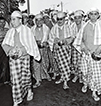
On April 15, 1960, Premier Zhou Enlai (first left) and Vice Premier Chen Yi (sunglasses) attend the Thingyan Festival celebration to kick off their visit to Myanmar. (DU XIUXIAN)
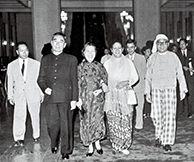
On October 3, 1960, Premier Zhou Enlai (second left) and his wife Deng Yingchao (third left) host a farewell banquet for visiting Myanmar Prime Minister U Nu (right) and his wife. (LI JILU)
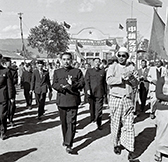
Premier Zhou Enlai (left) and Prime Minister U Ba Swe (right) walk across the Nine Valley-Wanding Bridge to attend a border inhabitants’ celebration after Premier Zhou’s visit to Myanmar on December 16, 1956. (LIU QINGRUI)
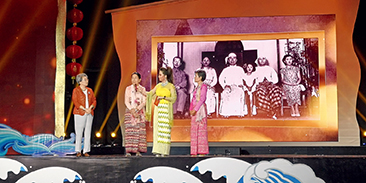
Zhou Bingde (first left) joins former Myanmar Prime Minister U Ba Swe’s daughter Nay Yee (first right) and U Nu’s daughter Than Than (second left) to share stories from history.


 Copy Reference
Copy Reference